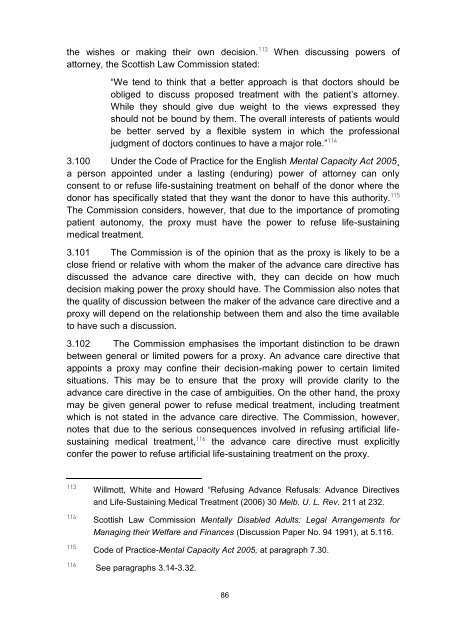Report on Bioethics: Advance Care Directives - Law Reform ...
Report on Bioethics: Advance Care Directives - Law Reform ...
Report on Bioethics: Advance Care Directives - Law Reform ...
Create successful ePaper yourself
Turn your PDF publications into a flip-book with our unique Google optimized e-Paper software.
the wishes or making their own decisi<strong>on</strong>. 113 When discussing powers ofattorney, the Scottish <strong>Law</strong> Commissi<strong>on</strong> stated:―We tend to think that a better approach is that doctors should beobliged to discuss proposed treatment with the patient‘s attorney.While they should give due weight to the views expressed theyshould not be bound by them. The overall interests of patients wouldbe better served by a flexible system in which the professi<strong>on</strong>aljudgment of doctors c<strong>on</strong>tinues to have a major role.‖ 1143.100 Under the Code of Practice for the English Mental Capacity Act 2005¸a pers<strong>on</strong> appointed under a lasting (enduring) power of attorney can <strong>on</strong>lyc<strong>on</strong>sent to or refuse life-sustaining treatment <strong>on</strong> behalf of the d<strong>on</strong>or where thed<strong>on</strong>or has specifically stated that they want the d<strong>on</strong>or to have this authority. 115The Commissi<strong>on</strong> c<strong>on</strong>siders, however, that due to the importance of promotingpatient aut<strong>on</strong>omy, the proxy must have the power to refuse life-sustainingmedical treatment.3.101 The Commissi<strong>on</strong> is of the opini<strong>on</strong> that as the proxy is likely to be aclose friend or relative with whom the maker of the advance care directive hasdiscussed the advance care directive with, they can decide <strong>on</strong> how muchdecisi<strong>on</strong> making power the proxy should have. The Commissi<strong>on</strong> also notes thatthe quality of discussi<strong>on</strong> between the maker of the advance care directive and aproxy will depend <strong>on</strong> the relati<strong>on</strong>ship between them and also the time availableto have such a discussi<strong>on</strong>.3.102 The Commissi<strong>on</strong> emphasises the important distincti<strong>on</strong> to be drawnbetween general or limited powers for a proxy. An advance care directive thatappoints a proxy may c<strong>on</strong>fine their decisi<strong>on</strong>-making power to certain limitedsituati<strong>on</strong>s. This may be to ensure that the proxy will provide clarity to theadvance care directive in the case of ambiguities. On the other hand, the proxymay be given general power to refuse medical treatment, including treatmentwhich is not stated in the advance care directive. The Commissi<strong>on</strong>, however,notes that due to the serious c<strong>on</strong>sequences involved in refusing artificial lifesustainingmedical treatment, 116 the advance care directive must explicitlyc<strong>on</strong>fer the power to refuse artificial life-sustaining treatment <strong>on</strong> the proxy.113114115116Willmott, White and Howard ―Refusing <strong>Advance</strong> Refusals: <strong>Advance</strong> <strong>Directives</strong>and Life-Sustaining Medical Treatment (2006) 30 Melb. U. L. Rev. 211 at 232.Scottish <strong>Law</strong> Commissi<strong>on</strong> Mentally Disabled Adults: Legal Arrangements forManaging their Welfare and Finances (Discussi<strong>on</strong> Paper No. 94 1991), at 5.116.Code of Practice-Mental Capacity Act 2005, at paragraph 7.30.See paragraphs 3.14-3.32.86
















